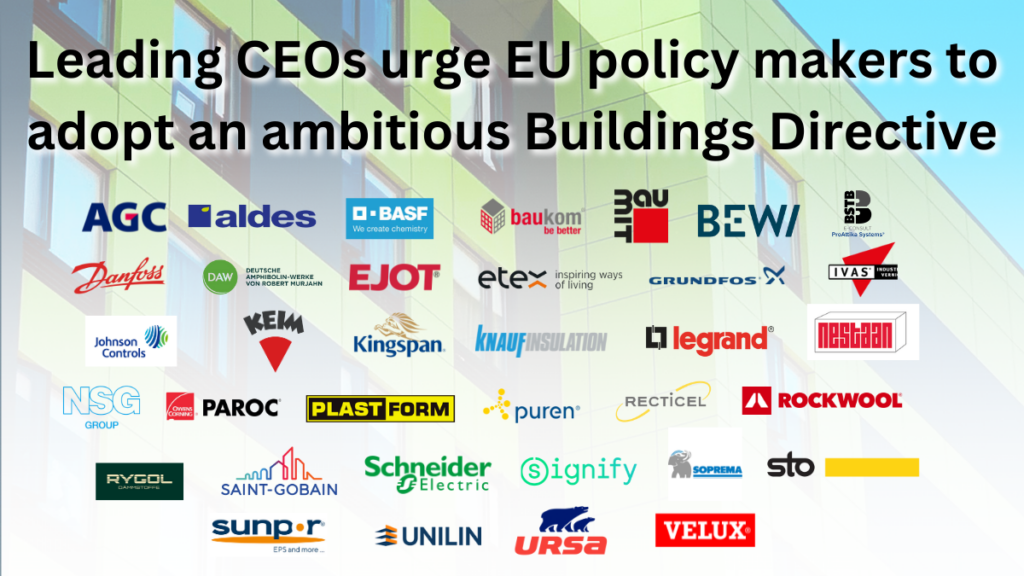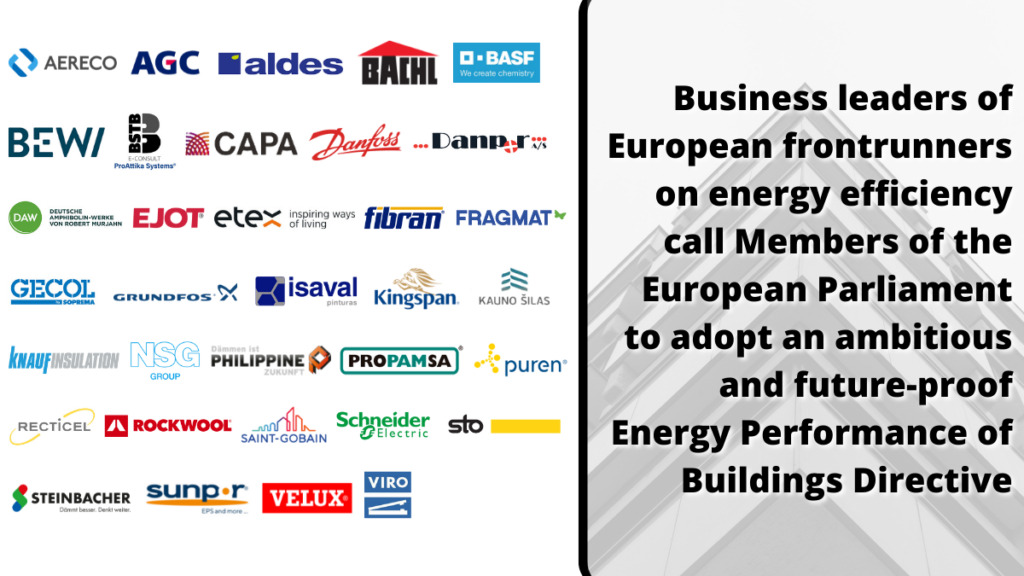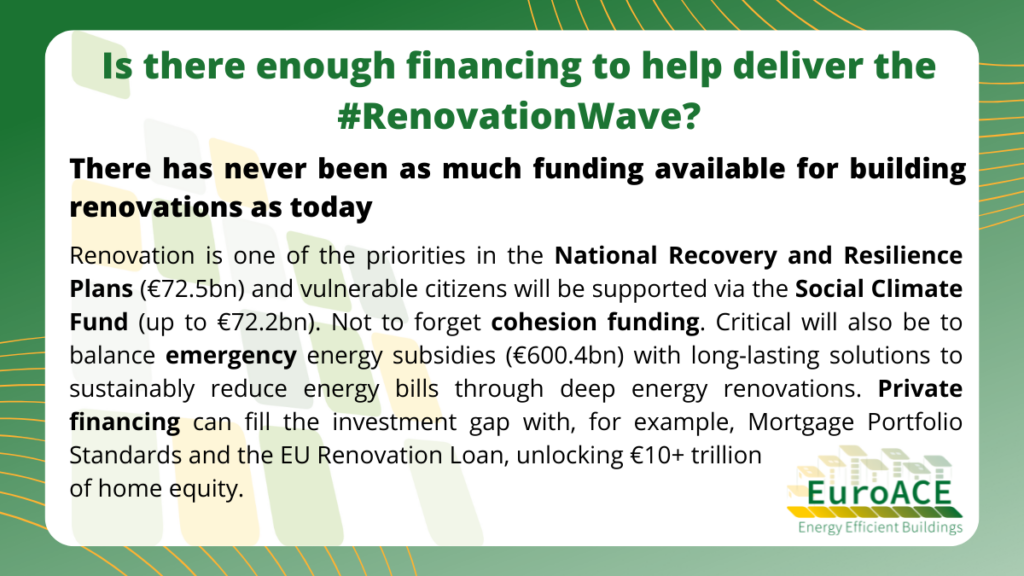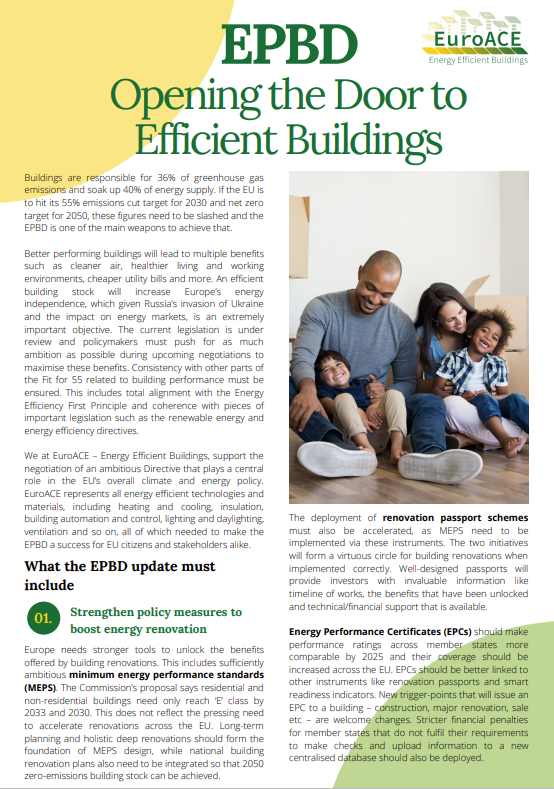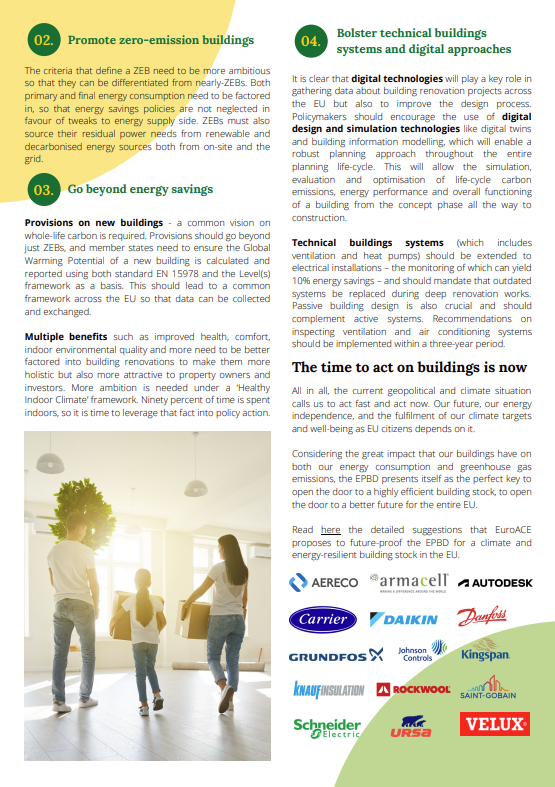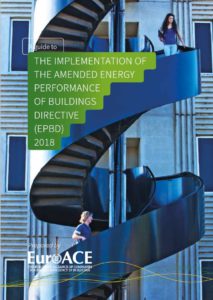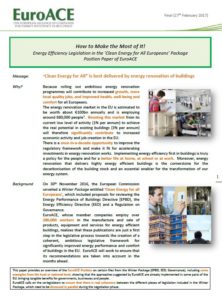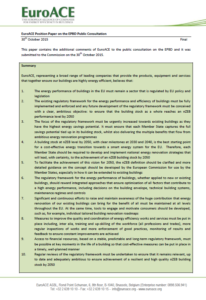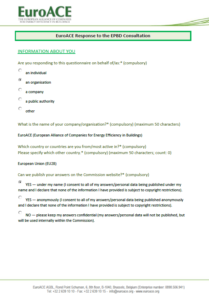
35 CEOs call on European Commission President Von Der Leyen to deliver a future-proof EPBD
Dear President von der Leyen,
We, business leaders of European frontrunners on energy efficiency in buildings, support the swift adoption of an ambitious Energy Performance of Buildings Directive (EPBD). While necessary short term energy savings have been the Commission’s focus last year, structural measures should be adopted by the end of the mandate to reinforce Europe’s industrial competitiveness through energy efficiency in buildings.
Buildings represent over one third of our GHG emissions – and it is vital the Green Deal’s last cornerstone adequately reflects the importance of this sector towards meeting climate goals. Beyond this, efficient buildings and energy renovations exemplify the green transition’s objectives: they create local jobs, shelter European citizens and businesses from high energy prices, and improve overall living conditions.
Speed is of the essence but the EPBD’s ambition should not be sacrificed in the name of a quick deal. We count on the European Commission to stand strong and defend this important piece of legislation.
This Directive can become the EU’s industrial policy for the construction and energy efficiency sector.
EPBD adoption in the European Parliament – A strong mandate to increase energy efficiency in buildings
On March 14th, 2023, The Report on the Energy Performance of Buildings Directive (EPBD) adopted by the European Parliament provides welcome improvements to the European Commission proposal. Co-legislators now need to ensure the final Directive is in line with the EU Renovation Wave’s objectives.
47 CEOs call for the adoption of an ambitious EPBD
Energy efficiency is the best policy to shelter European citizens and businesses from high energy prices, restore European sovereignty while improving living conditions of our citizens.
47 Business leaders of European frontrunners on energy efficiency, strongly encourage Members of the European Parliament to adopt an ambitious and future-proof Energy Performance of Buildings Directive (EPBD). This crucial piece of legislation must align the 3 ingredients to boost dormant renovation rates:
- A solid Minimum Energy Performance Standard (MEPS) regime
- Increased access to quality information and guidance
- New instruments are needed to mobilise finance
EPBD adoption in the ITRE Committee – Limited improvements to the Commission proposal
On February 09th, 2023, the European Parliament’s ITRE Committee adopted its Report on the Energy Performance of Buildings Directive (EPBD). Following lengthy negotiations, the text provides welcome, albeit limited, improvements to the European Commission proposal. Energy Efficiency industry players now call on the Members of the European Parliament to avoid further delays and give a clear mandate to the Rapporteur during the upcoming vote in Strasbourg.
Act firmly on energy security – Walk the talk on energy efficiency
Energy efficiency is the best policy to shelter European citizens and businesses from high energy prices, restore European sovereignty while improving living conditions of our citizens.
Business leaders of European frontrunners on energy efficiency, strongly encourage Members of the European Parliament to adopt an ambitious and future-proof Energy Performance of Buildings Directive (EPBD). This crucial piece of legislation must align the 3 ingredients to boost dormant renovation rates:
- A solid Minimum Energy Performance Standard (MEPS) regime
- Increased access to quality information and guidance
- New instruments are needed to mobilise finance
The economic case supporting ambition in the EPBD
Years of inaction on energy efficiency in the building sector are having a dramatic impact on households and public finances. Energy bills are expected to triple in some Member States compared to previous years, exposing millions to the risks of energy poverty and/or the inability to make mortgage payments. In turn, this becomes a credit risk for banks, as demonstrated by the European Central Bank (ECB) climate stress test from July of this year.
A recent assessment by Bruegel indicates that around 4% of the EU GDP (around €350 billion + €200 billion recently announced by Germany) has already been spent by Member States on subsidising energy bills. This amount is greater that the Commission’s own assessment of how much would be needed per year to double deep energy renovation in the EU.
Support for citizens and businesses is already available: Energy renovations are investments that improve living conditions, increase property value and decrease energy bills. And there has never been as much financial support available for households and businesses as today. However, there is currently a clear mismatch when it comes to investments in renovation, something an ambitious EPBD can help tackle.
EPBD General Approach – Not yet walking the talk
On October 25th, 2022, the European Council adopted its General Approach on the Energy Performance of Buildings Directive (EPBD). While negotiators maintained essential elements of the Commission proposal, it fails to match the ambition level needed to answer the current energy crisis and put the EU on a path to achieve its energy and climate goals.
Ambitious Minimum Energy Performance Standards: A no regret option (Joint Letter)
Leading industry players, NGOs, think tanks and investors are thus calling Members of the European Parliament to adopt ambitious Minimum Energy Performance Standards (MEPS) in the EPBD recast. MEPS are the main tool addressing the pressing issues of energy poverty, energy security and decarbonisation in the revised text and are critical for both planning purposes and for execution.
EPBD: Opening the Door to Efficient Buildings
An easy-to-read and easy-to-understand two-pager with which you can get a clear sense of our main asks and demands from the ongoing EPBD revision.
Namely, strengthen policy measures to boost renovation, promote zero-emission buildings, go beyond energy savings and bolster technical buildings systems, and digital approaches.
Buildings in the Fit for 55 Package for a Climate Neutral Economy in 2050
To achieve at least 55% reduction in GHG emissions by 2030, the EU must reduce GHG emissions from buildings by 60%, their energy consumption by 14%. In view of these targets, and in the context of the Fit for 55 Package, we must ensure that across different Directives affecting buildings and their energy performance, we create a coherent and robust framework that will lead us to a zero-emissions building stock by 2050.
EPBD (2022)
EuroACE – Energy Efficient Buildings, welcomes the revised Energy Performance of Buildings Directive (EPBD).
In view of the attainment of the EU energy and climate goals, and the multiple societal, health and economic benefits that a well-performing building stock entails for EU citizens, the EPBD should play a central role in the Fit for 55 Package. With its new and revised elements, and its extended scope, the European Commission has made a step forward in enabling our building sector to achieve the goals set out by the Renovation Wave Strategy, but more ambition will be needed from the building sector at large to make the goals set for 2030 and 2050 a reality.
The EPBD must play a more central role in the Fit for 55 Package. In line with the need to strengthen its level of ambition, our main recommendations are:
- Strengthening the level of ambition Minimum Energy Performance Standards (MEPS)
- More ambitious Zero-Emissions Buildings (ZEB) standards using both primary and final energy indicators
- More ambitious timeline and next steps for implementation of provisions should be better addressed for new buildings
- Addressing and defining “Healthy Indoor Climate”
- Ensuring better Energy Performance Certificates (EPCs) coverage
- Extending the scope of Technical Building Systems (TBS) to electrical installations and introducing a clear provision to require that outdated and inefficient TBS are replaced as part of holistic deep energy renovations
- The introduction of a timeline to implement recommendations stemming from inspection reports is needed
EPBD (2021)
As part of the European Green Deal, the European Commission via its “Fit for 55 Package” started in 2021 the revision of those EU policies that are needed to deliver on the GHG reduction targets agreed in the European Climate Law, among which the Energy Performance of Buildings Directive (EPBD) is included. As part of the current revision, the main elements that are being revised and/or taken into consideration in the current text of the Directive are:
- The possible introduction of Minimum Energy Performance Standards (MEPS) to spur both rate and depth of energy renovations across the EU
- The update of the Long-term Renovation Strategies requirements
- The update of “nearly-zero energy buildings” definition
- The update of the energy performance certificates (EPC) requirements and overall framework
- A new definition for “deep energy renovation”
- A more important role for digital solutions and a data-centric approach to assess the energy performance of buildings
- A possible extension of scope of the Directive (i.e., inclusion of whole-life cycle carbon assessment of buildings)
This position paper sets out the recommendations of EuroACE, which are built on its formal response to the Open Public Consultation on the Directive and are divided in three main groups:
- New provisions that should be introduced
- Elements that must be strengthened
- The scope of the Directive
The body of the paper describes the recommendations in more detail and the whole paper is supported by an Annexe that recalls the legislative context that the EPBD fits into and that explains why buildings (both new and existing) have a crucial role to play in achieving long-term climate and energy efficiency goals.
National Dialogue Events
EuroACE regularly organises National Dialogue Events in order to foster transposition and application of buildings-related EU Directives (EPBD and EED). The most recent events have taken place in Germany (January 2020), Slovenia (2019), France (2018), Spain (2017), Poland (November 2015), and Italy (February 2015). Click here for more information.
EPBD (2018)
The 2010 EPBD foresaw in its Article 19 that the Directive must be evaluated by 1st January 2017 at the latest. In this framework, and in view of the 2030 targets, the EPBD has been amended. On 19th June 2018, the amending Directive 2018/844 was published, with a transposition deadline in March 2020. Main points are:
- The move of the national long-term renovation strategies from Article 4 of the Energy Efficiency Directive to the Article 2A of the EPBD, with this provision being considerably strengthened;
- The option for Member States to develop the use of Building Renovation Passports (BRP) and the requirement for the European Commission to undertake, before 2020, a feasibility study on the possibilities and timeline for the introduction of BRPs as an option
- Better access to financing as well as links between financial measures and improved performance after renovation works
- Introduction of a Smart Readiness Indicator
- Changes to the provisions related to inspections of heating, cooling and ventilation systems, as well as provisions related to Technical Building Systems (mandatory individual room temperature room control, mandatory installation of Building Automation & Control systems by 2025 in large non-residential buildings…)
- Revision of Annex I on the methodology to describe the energy performance of buildings (increased transparency, and incentive to use EU standards)
EPBD (2010)
In 2010, the EPBD Recast (Directive 2010/31/EU) entered into force with a transposition deadline of July 2012. The updated text clarified, strengthened and extended the scope of the 2002 directive. Key changes included:
- Development of a comparative methodology framework for calculating cost-optimal levels of minimum energy performance requirements;
- Extension to all buildings of requirement to set minimum energy performance levels when a major renovation takes place;
- All new buildings to be nearly zero energy level by December 2020 (December 2018 for public authority buildings);
- Requirement for Member States to list financial incentives in place to enable the transition towards nearly zero energy levels in buildings;
- Mandatory energy certification for all properties constructed, sold or rented out;
- Enhanced heating and cooling system inspections and reporting requirements;
- Requirement for Member States to establish penalties for non-compliance.
Background Information – EPBD (2002)
The EPBD (Directive 2002/91/EC) has been the main European legislative instrument for improving the energy efficiency of Europe’s building stock. Under the Directive, the following obligations were introduced in all Member States:
- A methodology to calculate and rate the integrated energy performance of buildings;
- A system of energy certification for new and existing buildings, with display requirements for public buildings;
- Regular inspections of heating and air-conditioning systems;
- Minimum energy performance standards for new buildings and for existing buildings that undergo major renovation with a useful floor area over 1 000 m2.
